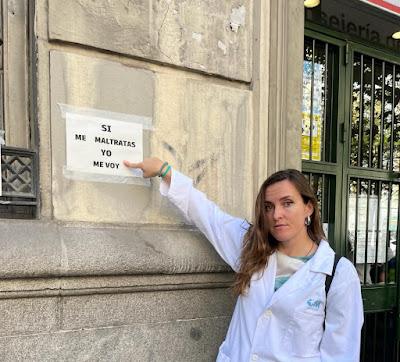
Foto de @RuizSusiKiu en una concentración frente a la Consejería de sanidad esta semana.
La situación de los servicios de urgencia rurales y de Atención Primaria de Madrid vive su peor crisis. La Consejería de Sanidad ha puesto encima de la mesa una propuesta que empeora mucho las condiciones laborales de sus profesionales, aumentado horas de trabajo, número de jornadas y turnos, suprimiendo libranzas y cambiando lugar y puesto de trabajo en muchos casos. Los sindicatos se han levantado de la mesa de negociación por haber sido ignorados y amenazan huelga, algo que médicos y enfermeras aborrecen por la dificultad de plantearla con los servicios mínimos abusivos que se impondrán.
Venimos de una situación precaria, la Consejería cerró los centros de urgencias de Atención Primaria (SUAP) durante la pandemia destinando sus médicos al Hospital Zendal y a las unidades de Atención Domiciliaria provisionales. Quedaron abiertos únicamente los servicios de atención rural (SAR) que se vieron sobrecargados por asumir en parte el volumen de urgencias que no se atendían en los SUAP. Ahora quieren volver a refundirlo todo en un nuevo sistema en el que siguen faltando profesionales y con condiciones de trabajo peores. ¿Qué va a pasar?:
- Habrá huelga.
- Los profesionales se terminarán marchando del servicio.
- El servicio se precarizará todavía más o se cerrará en muchos casos.
- Probablemente se termine obligando a la ya sobrecargada plantilla de los centros de salud a asumir turnos extra.
- Se sobrecargarán las urgencias de hospital.
- La ciudadanía se quedará con menos servicios cerca de ella y tendrá que desplazarse más lejos y esperar más.
Y las elecciones a seis meses vista, no duden en que la actual Consejería prometerá algún hospital nuevo (en la sierra norte, donde lo que faltan son mejores servicios de urgencia rural y de Atención Primaria) o nuevos centros de salud (sin aumento de efectivos). Lamentablemente de momento los ladrillos no saben atender al ciudadano.
Durante la pandemia se debilitó la Atención Primaria de Madrid en lugar de reforzarla y desgraciadamente esa sigue siendo la política. ¿Se puede permitir Madrid tener una sanidad pública agonizante?

Why are Madrid's emergency services in danger?
The situation of Madrid's rural and primary care emergency services is going through its worst crisis ever. The Regional Ministry of Health has put on the table a proposal that greatly worsens the working conditions of its professionals, increasing working hours, number of working days and shifts, eliminating time off and changing the place and position of work in many cases. The unions have walked out of the negotiating table because they have been ignored and are threatening strike action, something that doctors and nurses abhor because of the difficulty of proposing it with the abusive minimum services that will be imposed.
We come from a precarious situation, the Regional Ministry closed the primary care emergency centres (SUAP) during the pandemic, assigning its doctors to the Zendal Hospital and the provisional home care units. Only the rural care services (SAR) were left open, which were overloaded by taking on part of the volume of emergencies that were not attended to in the SUAPs. Now they want to recast everything in a new system in which there is still a lack of professionals and worse working conditions. What is going to happen?
1. There will be a strike.
2. The professionals will end up leaving the service.
3. The service will become even more precarious or will be closed in many cases.
4. The already overburdened staff of the health centres will probably end up being forced to take on extra shifts.
5. Hospital emergency departments will be overloaded.
6. Citizens will be left with fewer services close to them and will have to travel further and wait longer.
And with the elections six months away, no doubt that the current Regional Ministry will promise a new hospital (in the northern highlands, where what is lacking are better rural emergency services and primary care) or new health centres (with no increase in staff). Unfortunately, for the moment the bricks do not know how to serve the citizen.
During the pandemic Madrid's primary health care was weakened instead of strengthened and unfortunately this is still the policy. Can Madrid afford to have a dying public health system?
为什么马德里的紧急服务处于危险之中?
自动翻译,抱歉有错误。
马德里的农村和初级医疗急救服务的情况正在经历有史以来最严重的危机。地区卫生部提出了一项提案,大大恶化了其专业人员的工作条件,增加了工作时间、工作日和轮班数,取消了休息时间,并在许多情况下改变了工作地点和位置。工会已经走出了谈判桌,因为他们被忽视了,并威胁要采取罢工行动,这是医生和护士所憎恶的,因为在即将实施的滥用最低服务的情况下,很难提出罢工。
我们来自一个不稳定的情况,地区部在大流行期间关闭了初级保健急救中心(SUAP),将其医生分配到Zendal医院和临时家庭护理单位。只有农村护理服务(SAR)是开放的,由于承担了部分没有在SUAPs中得到处理的紧急情况,这些服务已经超负荷。现在他们想在一个新的系统中重铸一切,在这个系统中仍然缺乏专业人员,工作条件更差。 会发生什么呢?
1.将有一次罢工。
2. 专业人士最终会离开服务。
3. 服务将变得更加不稳定,或者在许多情况下将被关闭。
4. 卫生中心已经负担过重的工作人员最终可能会被迫承担额外的班次。
5. 医院急诊科将超负荷运转。
6. 公民们在他们附近得到的服务将减少,他们将不得不去更远的地方,等待更长时间。
还有6个月就要选举了,毫无疑问,目前的地区部将承诺建立一所新的医院(在北部高地,那里缺少的是更好的农村急救服务和初级保健)或新的保健中心(但不增加工作人员)。不幸的是,就目前而言,砖头不知道如何为公民服务。
在大流行期间,马德里的初级卫生保健被削弱而不是加强,不幸的是,这仍然是一项政策。 马德里能够承受一个垂死的公共卫生系统吗?
